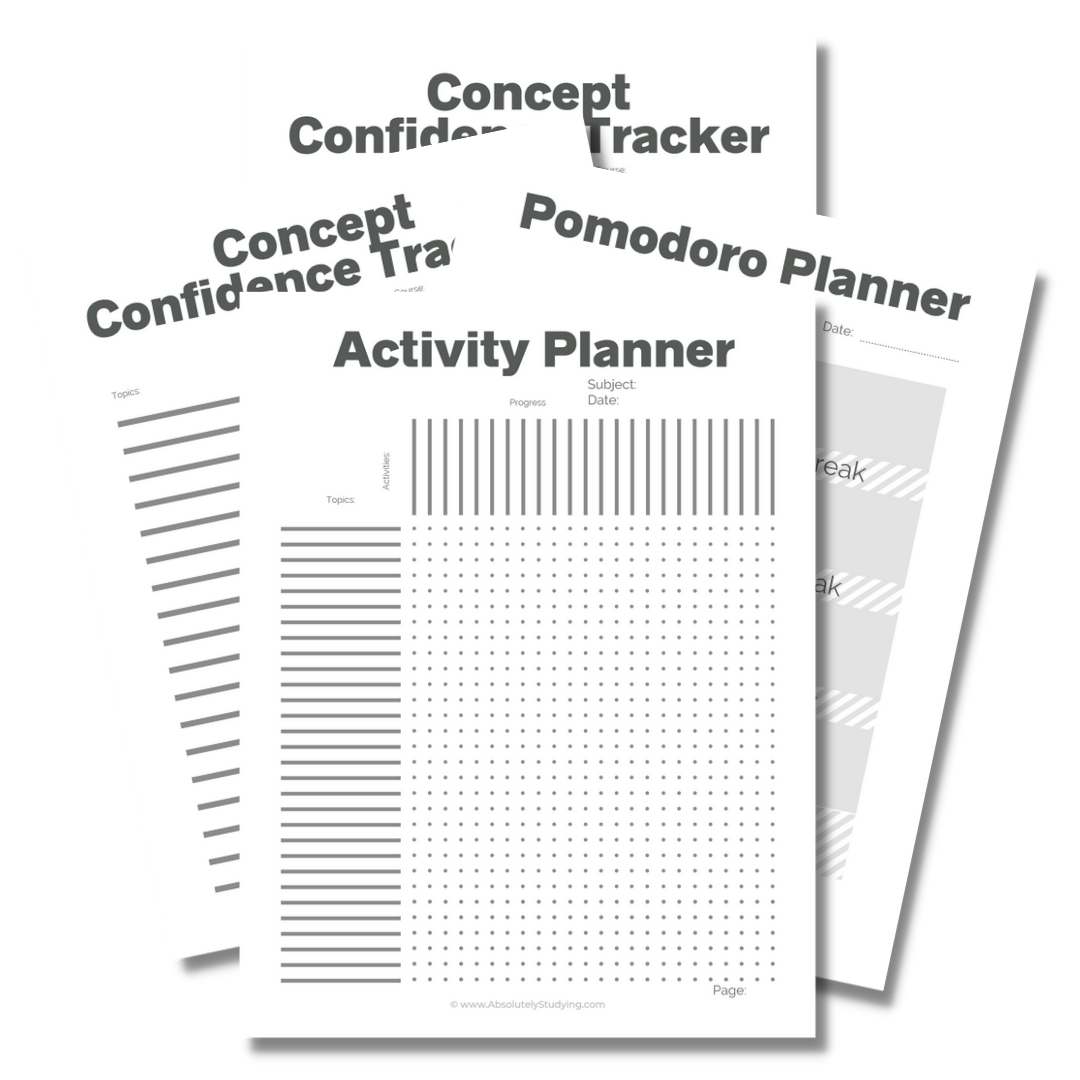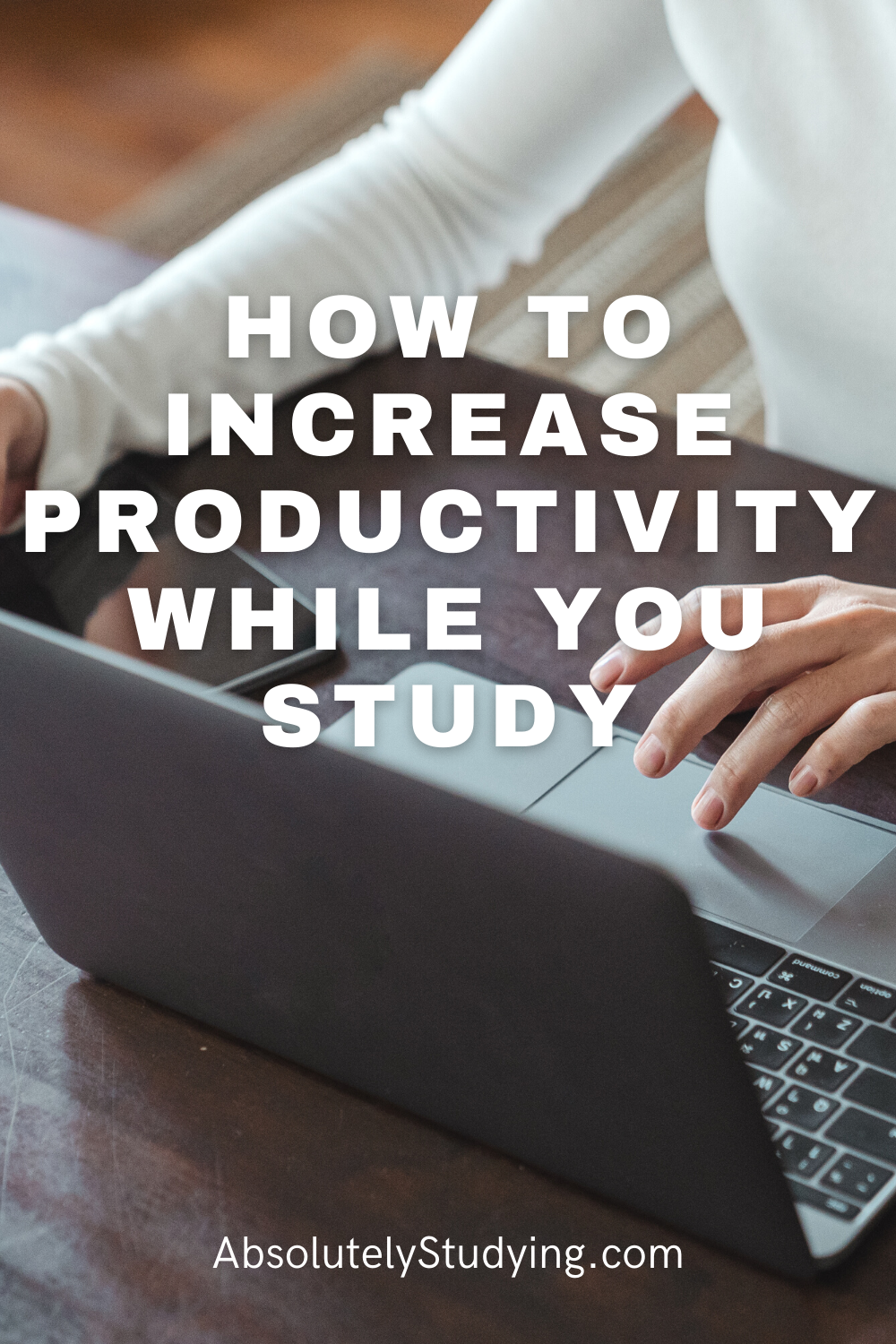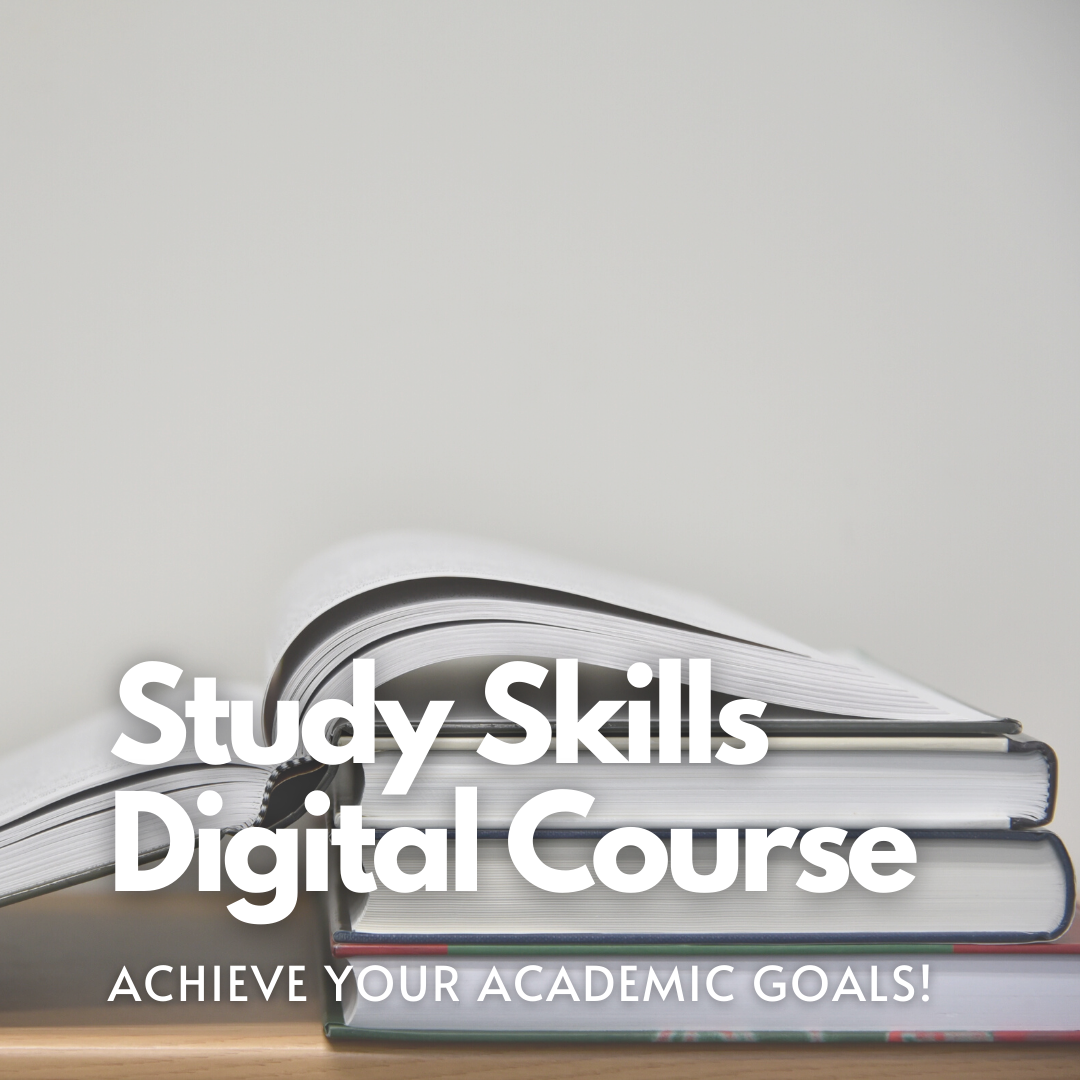How to Increase your Productivity While You Study
Increase Productivity While you Study
How to refuel your focus and make you monumentally productive.
Everything you need for the semester you want!
This bundle includes:
The Syllabus Study Planner
The Pomodoro Planner
A Confidence Tracker
A Q&A planner
The “Get Organized Checklist”
and more!
This workbook is full of super useful resources that can be applied to every aspect of your day.
* Disclaimer * Some of the posted links are affiliate programs. By clicking these links, I may receive monetary compensation. This will not alter the price or change the buyer's experience.
It’s exam time, and you have a million things to do. You have exams to study for, papers to complete and, you somehow have to set some time aside to save your sanity. But there are only so many hours in a day, what can you do? You can increase productivity in the time you have.
The most effective ways to study are those that make the most of your time. While we have many study tips on how to plan your revision sessions, we need to discuss a counterintuitive yet simple study hack that tells you to stop, walk away from that pile and take a break.
If you need some new activities to freshen up your study session, don’t forget to download my free study planner and activity tracker. It has more than 20 different study activities to try and track through your class. Download it here.
Today we are going to talk about how your brain prioritizes your tasks. How does it stay engaged and allow you to focus on a single task for an extended period of time. Usually, after a long study session, you notice that your brain just doesn’t want to focus anymore. This is a natural response to an extended stimulus.
We can retrain your brain and allow it to more easily focus longer. Follow these simple steps to unlock unlimited productivity while you study.
Get your study guide template!
Everything you need for the semester you want!
What is Productivity, and Why Does it Matter?
Productivity is a measure of the results, or output, produced by the effort you have put forth. Ideally, you want the maximum amount of work possible for the lowest action.
This is especially important when you are working with limited time, as most students do. You have so much reading, homework, and studying to do, and still, somehow attend classes, juggle a job, and meet family commitments.
Making the most of your time is essential to not burning out. This simple strategy will explain precisely how you can make to most of your productive time, ensuring you get maximum output for your efforts.
How to Increase Productivity while you Study
One of the most important components of productivity is concentration. The only problem is that concentration is quickly depleted. If you spend too much time in deep focus, you are going to burn out.
Taking a break during your study sessions is as essential as the study time itself. As time carries on, it gets more and more difficult to register the task at hand. When our brains are bombarded for extended periods with the same stimulus, they start to block that stimulus out. This brain-numbing is more formally known as “vigilance decrement.”
Effective studying accounts for vigilance decrement and compensates with focus restoring breaks.
Let’s look at it this way, you woke up this morning and decided to throw on your brand-new Chucks. For some reason, they are kind of squeezing your toes even though they fit perfectly in the store.
They are not too small, so they are comfortable enough. They just need to be stretched out. You decide that they NEED to be worn today, so you head out to the class. By the time you reach your lecture, you remember they were a little pinchy and wonder how you could have ever forgotten.
Because the squeezy feeling was a constant stimulus, your brain decided to block attention to it just like it blocks out the feel of all the rest of your clothing.
If you had to pay attention to every single stimulus that your brain encountered every second of every day, it would be absolutely overwhelming. Instead, your brain does you the favour of prioritizing. Unfortunately, what your brain believes important is not always what you need it to consider as important. Just ask your exam scores and the blisters you end up with on your toes.
Your brain is like a cup, but does it runneth over?
Once upon a time, it was thought that your ability to focus was a finite resource. People thought you had a set amount that was spent like currency until your account was depleted. We now know that this not what is happening.
The amount of attention you have to spend never decreases. The balance always stays the same. So, why do you have trouble reading the last few paragraphs in that chapter? If you are not losing any attention, so where does it go?
Your mind is pulling your concentration away FROM other tasks or subjects.
Because of vigilance decrement, that stimulus is numbed, and your brain is actively putting it on the back burner because it has been in process too long. Your brain is now trying to prioritize other stimuli. Pulling focus away from the textbook on what you will wear tomorrow, eat for dinner, or how your leg has fallen asleep.
All those thoughts you stuffed down will come bubbling up simply because they are fresh, new, not related to this chapter of your textbook. And frankly, they are probably a lot more interesting.
This is not just another one of those “hack your brain” study tips. This advice will save your sanity. There is no avoiding the infamous marathon study sessions. They are a fact of post-secondary life. Sometimes just trying to study at the end of the day can be a chore. But you are obviously here because you want to push through it, find the best study tactics, and ace that exam.
The very first rule to planning an effective study strategy is simple, study often.
Make sure you are not just piling all the study time you need on one day a week. Planning out blocks of time to set aside every day is often your best course of action. Hit the books for shorter spurts as often as possible.
Still, even fitting in an hour or two every night can cause your work to pile up. You have lecture notes to review, textbooks to read, and even labs to prepare for! Multiply all of that by 4 or 5 classes, then add on your papers and homework. With all of these demands, you might find yourself seriously underwater. But today, we are not concerning ourselves with short-distance sprints. We want to talk about suggestions on making the most effective use of our marathon sessions.
Increase productivity by giving yourself a breather.
It has been shown that taking a break at least once an hour increases productivity. Upon returning, you will often find an impressive increase in your ability to focus on your task allowing you to stretch that focus for an extended period.
The break resets the timer of the stimulus and allows you to finally push through. When you return to your task, you will feel refreshed and energized.
I have had my best results with the Pomodoro Technique, which allows a short break every 25 minutes with a long one every fourth break. There are many apps for phones or extensions you can add to your browser to keep track of these.
Not only do breaks help you focus longer, but it has also been found to help you better retain the information you are taking in.
Better retention reaches far beyond absorbing and regurgitating. It can also help to make and solidify connections to existing knowledge. More relationships mean that more cues are available to trigger recall and lead you to the answer you need at exam time.
Get the most out of your breaks!
So now that we have established that taking breaks increases productivity, we should make sure that we are taking the right kinds of breaks. Be sure that you are stepping away from the material, even just to watch a video on baby elephants or pandas.
For longer breaks, a quick cardio workout can increase your productivity and creativity for approximately 2 hours afterwards, giving you much more than just a glow. The exercise will pump extra blood to your brain, flooding it with oxygen and getting those juices going. This can be incredibly inspirational after extended periods of sedentary sitting. It just might be the push you need to get a new perspective on the material.
One solution is to tackle activities or chores during your breaks. These can be especially useful if you schedule them during your slump times. If you know that you are least productive right after lunch, try to do your workout or run your errands during that time. This will save you from fighting an uphill battle and might clarify your study efforts once you return.
Maybe you can grab a quick bite to eat with a friend if you know you slip in the evening. One word of warning, though, make sure that this friend will support your return to studying and that you are strict with yourself to pick up where you left off.
Embrace the daydream.
Physical exercise is not the only break that works double time. Sometimes all you need is a quick daydream. We are taught early not to daydream and stay focused; however, recent studies might bust this myth right open. As it would appear, our brains basically have two settings, “focused” and “diffused.”
“Focused” mode is the one we have discussed, which allows you to hone in on that textbook and pay attention in lectures. This is the mode that our teachers and parents have been putting all the weight on. We are aware of the value of this mode so let me touch on the other.
“Diffuse” mode is the mode that takes over when we daydream or are relaxed. Strait out the gate, I should mention that in no way does your brain activity decline during this setting. In many areas, the activity actually increases.
While we are not often taught to appreciate the importance of daydreams. Anyone who has had a shower knows your mind often comes up with some of its most creative solutions during this mode.
Unfortunately, our minds can only operate in one setting at a time. It can never be in both focused and diffused mode simultaneously. Stepping away from your work for a short break and taking a little vacation in your mind can give your brain a chance to wander. Sometimes you can cultivate a creative new perspective on approaching a problem and, sometimes, even the solution itself.
Speaking of perspective, returning after a break can also help you rethink how you approach a project. After working on it, you will become focused on the task and not the big picture. When you step away and then return with a fresh mind, you are forced to do a quick audit of what you have done so far and your end goal, then decide if the path you are taking is your best option. At this point, you can determine if your plan of attack is the most effective strategy or if you should modify it.
Study Skills Digital Course
Learn how to create a stress-free comprehensive strategy!
5 Tips to Increase Productivity and Efficiency
If you take nothing else away from this article, at least remember this:
Take frequent short breaks.
Step away from your workspace.
Assess your progress when you return.
Daydream.
Do not overwork and burn yourself out.
So, there you go, the most effective way to study is to make sure that you are taking breaks from studying. This tip might go against every fibre of your being when you are far behind and have a thousand things to do, but it really is the best tactic.
It is useless to sit there and read chapter after chapter if your brain is simply not absorbing the information. Give it a rest, dance like one is watching, get that heart pumping and that body moving, then give it another shot.
Go for a walk and smell the flowers, have a shower, or grab a coffee with a friend. These are truly the best ways to study and facilitate the retention of knowledge. This is, hands down, one of my favourite study tips. It absolves me of the guilt I feel when I am not cramming my day 100% full of responsible activity.
Unlock Your Study Potential with the Productivity Workbook
In the quest for academic success, managing your time effectively and maintaining high productivity levels are key. That's where the Productivity Booster Pack comes into play—an essential companion designed to revolutionize the way you approach your studies.
The Productivity Booster Pack is a comprehensive tool that brings together innovative strategies and practical exercises to help you harness your full study potential. It's not just about working harder; it's about working smarter. Here’s what you can expect:
Personalized Study Plans: Tailor your study sessions to fit your unique learning style and objectives with customizable plan templates.
Focus Enhancement Techniques: Learn how to sharpen your focus, minimize distractions, and extend your concentration spans with proven methods and exercises.
Efficiency Boosters: Discover strategies to maximize your study efficiency, ensuring you get the most out of every minute you invest in learning.
Progress Tracking: Keep a detailed record of your study progress and evaluate your productivity levels, helping you stay motivated and on track.
Well-being Tips: Balance is crucial. Find valuable advice on maintaining your well-being while studying intensively, ensuring that your productivity boost doesn't come at the expense of your health.
Why Incorporate the Productivity Workbook into Your Study Routine?
Enhanced Learning: Dive deeper into your subjects and retain information more effectively with targeted productivity strategies.
Time Management: Reclaim your time and allocate it wisely across your various commitments, from academic obligations to personal interests.
Stress Reduction: Reduce study-related stress by adopting a more organized and proactive approach to your coursework.
Achievement Unlocked: Set and achieve your academic goals with a clear, structured plan that guides you toward success.
Take the First Step Towards Enhanced Productivity
Don't let unstructured study sessions and dwindling focus hold you back from reaching your academic potential. Embrace the Productivity Booster Pack and turn your study time into a powerhouse of efficiency and success.
Elevate your study sessions, ace your exams, and achieve your academic goals with ease. Grab your copy of the Productivity Booster Pack today and start transforming your study habits for the better!
As we've explored the myriad of strategies to enhance your productivity while studying, one thing remains clear: the right approach and tools can transform your academic experience. It's not just about cramming more hours into your study sessions; it's about making each minute count, rejuvenating your focus, and optimizing your learning process.
The journey toward achieving unparalleled productivity and academic success is at your fingertips. With the insights and techniques shared, you're now equipped to tackle your study sessions with a newfound passion and strategy. But why stop there? To truly revolutionize your approach to studying, a comprehensive plan is essential—and that's where our Study Guide Template comes into play.
Our free Study Guide Template is more than just a planning tool; it's your personal roadmap to successful, efficient, and rewarding study sessions. Tailored to fit your unique needs and goals, this template empowers you to:
Structure your study time effectively, ensuring every subject gets the attention it deserves.
Implement the productivity-boosting techniques we've discussed, from focused study bursts to essential breaks.
Track your progress, celebrate your successes, and identify areas for improvement.
Don't let your potential to excel slip through the cracks of unorganized and unfocused study habits. Seize the opportunity to elevate your study routine, enhance your productivity, and achieve the academic success you're capable of.
Download Your Free Study Guide Template now and embark on the path to a more organized, focused, and productive study experience. Your future self will thank you.
I would like to be transparent so that there are no misunderstandings. As an affiliate, I may earn a small commission from any products linked in this post. This is not a sponsored post, and I was not asked to recommend these products. These are products that I genuinely love and want to share with my audience.









